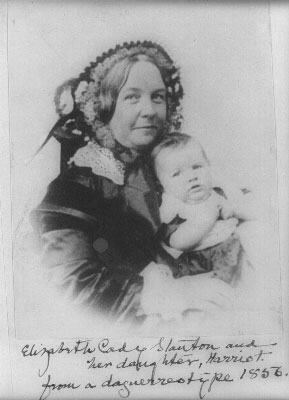|
Home >
Women's History Month >
Part 1: Women's Rights Pioneers >
Elizabeth Cady Stanton
Elizabeth Cady Stanton
Elizabeth Cady Stanton was a women's rights activist of the 1800's in the United States. Throughout her
life she fought for many issues such as women having the right to vote as well as the reformation of divorce laws,
married women having the right to property, wages and guardianship of their children. She was also very
active in the anti-slavery movement.
She was born on November 12, 1815 in New York to a family of wealth and privilege with a father who was a
prominent judge. When she was 11 years old her brother Eleazar died - leading her father to remark to her
'I wish you were a boy'. This led Elizabeth to be driven to excel in all she did - such as in Greek, Latin,
and math - to get her father's approval.
She eventually received a good education - for a woman at that time - at the Troy Female Seminary.
Elizabeth Cady eventually married Henry Stanton, who became an attorney and was involved in the anti-slavery movement.
At their wedding ceremony she insisted that the word 'obey' be omitted - and went by the name 'Elizabeth Cady Stanton',
refusing to be called 'Mrs. Henry B. Stanton'. She had 7 children - five sons and two daughters.
In 1840, two days after she was married, she and her husband went to London for the first World Anti-Slavery Convention.
Henry was a delegate at this convention, along with Wendell Philips and William Lloyd Garrison among others.
Women at the convention were forced to sit in a separate screened in section and were not allowed to speak or vote.
At this convention Elizabeth first met
Lucretia Mott - a Quaker who was involved in the Temperance, Anti-Slavery,
and Women's Rights movements.
 In 1848 on July 19th and 20th in Seneca Falls, New York - the first Women's Rights Convention took place.
It was organized by five women - 4 Quakers (Lucretia Mott, Jane Hunt, Martha Wright, Mary Ann McClintock)
and Elizabeth Cady Stanton.
In 1848 on July 19th and 20th in Seneca Falls, New York - the first Women's Rights Convention took place.
It was organized by five women - 4 Quakers (Lucretia Mott, Jane Hunt, Martha Wright, Mary Ann McClintock)
and Elizabeth Cady Stanton.
At the Seneca Falls Convention the Declaration of Sentiments was presented and signed by 68 women and 32 men.
The Declaration of Sentiments includes a list of grievances and was modeled on the Declaration of Independence.
Later eleven resolutions were also presented. The last of these resolutions demanded that women be given
the right to vote - which was met with resistance as many believed that women weren't smart enough or didn't need
to be able to vote for themselves.
Elizabeth met
Susan B. Anthony in 1851 -
they became friends and worked together for the rest of their lives
to increase the rights of women. Elizabeth was interested in a broader set of rights than Susan (such as
coeducation and dress reform), who was
mostly interested in suffrage (the right to vote).
Susan and her went on to form the National Woman's Suffrage Association, which after merging with another group
became the National American Woman Suffrage Association. Elizabeth Cady Stanton was the first president of this
organization.
Elizabeth eventually contributed to many writings about women's rights including articles for the
women's rights newsletter The Revolution, the first of 3 volumes of the History of Woman Suffrage
as well as many speeches. She also toured the country when her kids were a little older and gave
many speeches herself.
Later in life she also wrote the Woman's Bible (ISBN 1573926965) which was more liberal and considered somewhat radical by
some conservatives. In it she challenged the religious doctrine presented in the bible of how women were inferior to men.
At the age of 76 in 1892 she gave what many consider to be her best speech: 'Solitude of Self'.
(ISBN 1930464010).
Elizabeth Cady Stanton died on October 26 in 1902 before women had won the right to vote.
Her daughter, (pictured above as a child with her mother in 1856) Harriot Eaton Stanton Blatch,
was a writer who continued to fight for women's rights - and was able to vote before her death in 1940.
Quotes from Elizabeth Cady Stanton
'The custom of calling women Mrs. John This and Mrs. Tom That and colored men Sambo and Zip Coon,
is founded on the principle that white men are lords of all.
'The history of mankind is a history of repeated injuries and usurpations on the part of man toward woman'
(from the Declaration of Sentiments)
'In entering upon the great work before us, we anticipate no small amount of misconception, misrepresentation,
and ridicule' (from the Declaration of Sentiments)
'The isolation of every human soul and the necessity of self-dependence must give each individual
the right, to choose his own surroundings.' (from Solitude of Self)
'No matter how much women prefer to lean, to be protected and supported, nor how much men desire to have them
do so, they must make the voyage of life alone, and for safety in an emergency they must know something of the
laws of navigation.' (from Solitude of Self)
'This is winter wheat we're sowing, and other hands will harvest. '
'The prejudice against color, of which we hear so much, is no stronger than that against sex. It is produced
by the same cause, and manifested very much in the same way.'
Other sources of information about Elizabeth Cady Stanton
http://ecssba.rutgers.edu/studies/ecsbio.html
http://www.nps.gov/wori/ecs.htm
http://en.wikipedia.org/wiki/Elizabeth_cady_stanton
http://www.pbs.org/stantonanthony/index.html
http://womenshistory.about.com/library/bio/blstanton.htm
The Declaration of Sentiments
Women's Rights National Historical Park in Seneca Falls, New York
|
|

